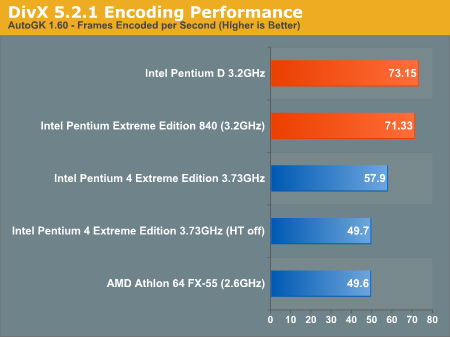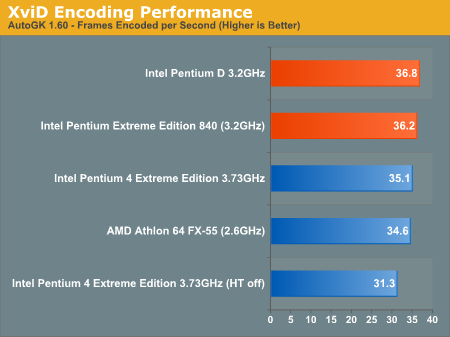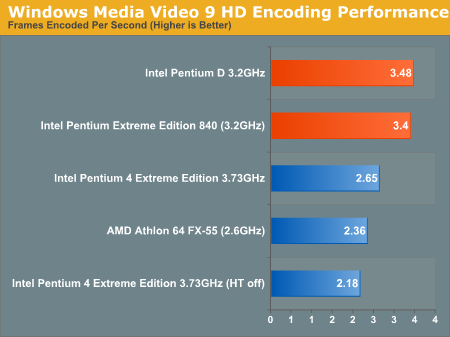Intel Dual Core Performance Preview Part I: First Encounter
by Anand Lal Shimpi on April 4, 2005 2:44 PM EST- Posted in
- CPUs
Encoding Performance
These new dual core CPUs are supposed to usher in a new era of media rich application usage models. They are supposed to enable us to do things that we were never able to do before. Let's find out if that's true or not...
First, we start off with iTunes to test MP3 encoding performance. We took a 12MB .wav file of our own creation and encoded it to a 192kbps MP3 file, measuring how long it took to encode the file.

Once again, we see that the Pentium Extreme Edition 840 is able to offer equal performance to the 3.73EE at 29 seconds. What's truly interesting is that the Pentium D running at 3.2GHz actually offers better performance than the Extreme Edition. We can only assume that 4 threads in iTunes begins to reduce performance, with 2 concurrent threads being the optimal point.
But once again, the performance gains aren't impressive. So far, dual core isn't looking too good.
DivX Encoding Performance
Our DivX tests from previous CPU reviews have shown a pretty sizeable improvement due to Hyper Threading, so we expected a similarly impressive gain due to dual core:

...and we were not disappointed. The Pentium Extreme Edition 840 offered more than a 20% increase in performance in our DivX encoding task when compared to the 3.73GHz single core P4 Extreme Edition.
We also see another example of four threads offering no performance improvement over being able to execute two concurrently, as the Pentium D running at 3.2GHz offers equal performance to the 840.
XviD Encoding Performance

The XviD tests show no real improvement due to dual core, but also don't seem to show much of an improvement due to Hyper Threading either. This just goes to show you that not all encoding tasks will show tremendous benefits.
Windows Media Video 9 Encoding Performance
Once again, we see extremely strong performance from the new dual core chips, offering around a 30% performance improvement at 85% of the clock speed of the current king of the hill.

So, overall encoding performance is pretty strong on the dual core chips from Intel. Let's have a look at one more multi-threaded application before we get to the more interesting tests.










141 Comments
View All Comments
Hans Maulwurf - Monday, April 4, 2005 - link
#27 thats because these benches are opted for HT and dual core. Everybody should know they are not typical for usage of a desctop PC.Maybe dual core will be a good thing, but to value its implementation you have to compare it to, for example, a dual Xeon.
If I would take this review seriously we all should have buyed dual CPU systems some time ago. But some time ago nobody could show dual CPU desctop systems are useful.
Why did this change so radicially? Is it really the way we use our computers or is it just the way you benchmark when allowed to be one of only very few Intel-previewers?
Son of a N00b - Monday, April 4, 2005 - link
#11, next time label you post with *Caution Fanboy Post* so I do not waste my time reading your comments that are biased and misinformed...w0w! great preview, I cannot wait until six months from now you doing a head to head match up with SLI, dual core cpu rigs from both AMD and Intel....it should be very interesting indeed....Cannot wait to see what AMD's performancee is...it could go either way....
Anyway great article, keep up the great work that keeps us all coming back, it must be hell to come up with new benchmarks for these systems.
w00t go anandtech and dualies!
MaxisOne - Monday, April 4, 2005 - link
Hey Not even 1 Game Benchmark ? and wheres the temps ??MaxisOne - Monday, April 4, 2005 - link
cbuchach - Monday, April 4, 2005 - link
I think these are the first benchmarks I have seen where Hyperthreading was shown to make a significant performance difference outside of video encoding tasks or a few other specialized apps.Overall I think Hyperthreading amongst the enthusiast community has never held much worth mostly because it has little impact on gaming performance. But these benchmarks clearly show in my eyes that whether it be the single-core/hyperthreading or dual core chips, Intel is the way to go. I of course am not a big gamer but nonetheless most computer users, especially power users at least do some moderate multitasking. Having two virtual or real cores really does improve the computing experience up unitl this point, in mostly immeasurable ways.
redpriest_ - Monday, April 4, 2005 - link
When can I buy one? =PThese previews will probably be followed up by shipping versions 6 months from now.
AtaStrumf - Monday, April 4, 2005 - link
WAU this was a shocker! Sure didn't expect dual cores so soon.Great preview Anand! It covered all of the areas I was interested in and it basicly confirmed all my expectations.
It seems that one thing that can still bring dual cores to a grind is the I/O bottleneck. With everything going dual lately and with RAID controllers being as common as USB ports and HDDs being pretty cheap, I think it's time you retested how much of an impact RAID can have on desktop performance. If I remember correctly it was you who said that RAID made no sense on desktop, which essentially killed my burning desire to get one. What about now? If we're going dual we might as well go all out.
tynopik - Monday, April 4, 2005 - link
try running stuff with software raid5 eating up cpu cyclesBeenthere - Monday, April 4, 2005 - link
Hyperthreading does NOT significantly improve system performance unless the software is written for hyperthreading and there is damned little of that currently available. Dual core when execurted properly offers a considerable performance advantage. Intel's cobbled mess is sure to be a nightmare and when all the facts are known it will be impossible to conclude otherwise despite the cheerleading of the media.sri2000 - Monday, April 4, 2005 - link
#14 - As you say the enterprise market is where multi-processor rigs live (whether dual-cpu or dual-core), it's also where dual-core makes it's best financial case.ie. when Microsoft came out to say that their software license pricing will treat a dual-core cpu as a single processor (as opposed to pricing it as a dual-proc), that really gives businesses (especially small ones with tight budgets) a great incentive for getting dual-core servers (not to mention for those who're using Linux).
And since AMP will get dual-core Opterons out ahead of dual-core Xeons, it's an opportunity to get some nice growth in their small business server market share.